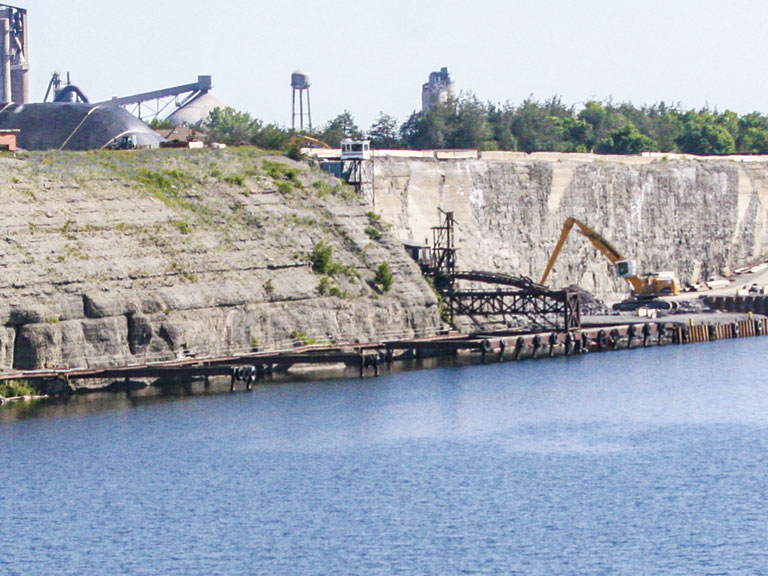County News
Fight for the bay

MOE, Terminals, residents all say they want the best for Picton Bay
It’s a misty morning on Picton Bay. At the shipyard on the north shore, sitting between the Essroc cement plant and the town of Picton, workers move road salt from small, open sections of tarped hills.
Road salt has been a staple product at the shipyard since 1984. When Doornekamp Construction, a company from Odessa, purchased the property in 2014, it wanted to ramp up the business, adding other shipping products like petroleum coke—a fine dust made from processed oil—and limestone aggregate.
Under Doornekamp, the new Picton Terminals has also looked into shipping other products, like industrial agricultural produce and even waste.
But for Doornekamp, the Terminals was a new venture that required a steep—and expensive— learning curve.
Since Doornekamps took over operations at the site, a group of residents, feeling a creeping sense of unease and frustration from the new management, has organized into a group called Save Picton Bay. That group has taken on lawyer Eric Gillespie, known locally for his successful work on behalf of a community group opposing two wind turbine projects during an environmental review process.
On November 1, the Ministry of Environment and Climate Change (MOECC) issued a provincial officer’s order with long list of work and reports for the Picton Terminals to comply with.
The list of 13 items on the work order, all due within three weeks of the order’s issuance, included covering all salt piles and improving the retaining wall for the salt retention pond, hiring an objective consultant and preparing a detailed plan to prevent further contamination.
The order also included a notice that, unless the company made an appeal, to not comply within the timeframe would amount to a provincial offence.
Despite the look of the order, Ben Doornekamp, who manages the site, says the perception that it was a provincial officer turning up at their door and threatening them to clean up their act is misguided.
Most of the items in the provincial order were the company’s idea, according to Doornekamp, and creating a provincial work order is just part of the process. To date, he says most of the items on the order have been submitted, with the exception of a work order to clean up salt at a neighbouring property. For this, the company has received an extension, as the work is complicated and involves understanding what already exists on the site.
Doornekamp also says that while his company is making an effort to develop best pracitces to protect the environment, a lot of the mess his company is cleaning was made by the company that ran the shipyards before he took it over, and that it is years of salt contamination that make the area so salty.
Along with the order was a report of the issues currently facing the company as it proceeds.
Kelly begins by recognizing the company’s good intentions—to provide better import and export services and to improve the efficiency of the shipping dock, which had already been active since 1991, long before it was taken over as Picton Terminals.
But she also reports observing salt leaching into water in neighbouring ponds and into the bay. She reports several complaints from neighbours, including about zoning, stockpiling material and, of course, the salt. The complaints were justified—the Terminals have been operating under the wrong zoning, although according to the County’s Public Works manager, Robert McAuley, in September the County approved its application for a zoning change. A public meeting will be scheduled shortly to address the zoning change.
And in studying samples of water from the bay and from a neighbouring pond, tests showed high concentrations of salt. It goes along with anecdotal observations, like dead frogs and salamanders in nearby ponds. It was, the report stated, “determined to be of a quality that would impair the receiving waters of Picton Bay.”
In speaking with the company, Kelly reported that they were amenable to improving, sending water samples to the ministry and taking steps to improve both the retaining pond for the site and covering the salt and other materials so they couldn’t contaminate the environment.
But later, she expressed concern the company was not living up to its word.
As late as this October, she reports visiting the site and seeing petroleum coke and road salt piles partially uncovered, and says reports she had requested came back incomplete.
“I reasonably believe that PT has contravened or is contravening those provisions of the EPA and OWRA as outlined in the Contraventions section or Suspected Violation(s)/Offences section of the report, and the requirements specified in this order are reasonable and necessary to address the identified contraventions,” Kelly wrote.

Mr. Doornekamp truly is amazing isn’t he. He actually tells the MOECC just what orders should be put in place to bring his environmental disaster into compliance with the Law. Perhaps he’ll want to be put on their payroll for his hard work?? Does anyone at the Times confirm information before putting it into the public domain? All it requires is a drive down Chapel Hill Road to see that Picton Terminals has not actually done the work, take a picture and put it into the paper.
The article contains some inaccuracies. 1. Salt has been shipped since 1993, not 1984; 2. Petcoke is a trucked in and out, not shipped; 3. the Provincial Officer’s Order is not “just part of the process”, there are serious consequences if its provisions are not followed; 4. to date, no one has contacted Mike Hymus about remediation of his property despite a promise by PT on Aug. 17.